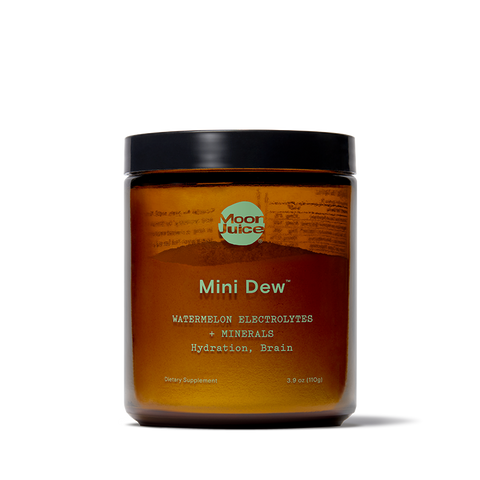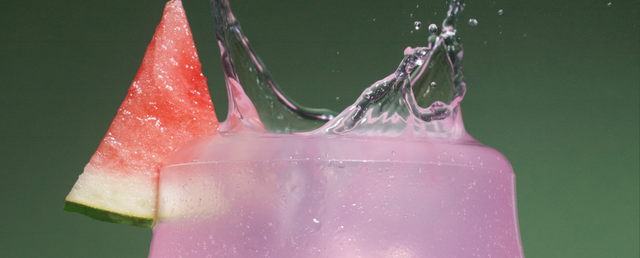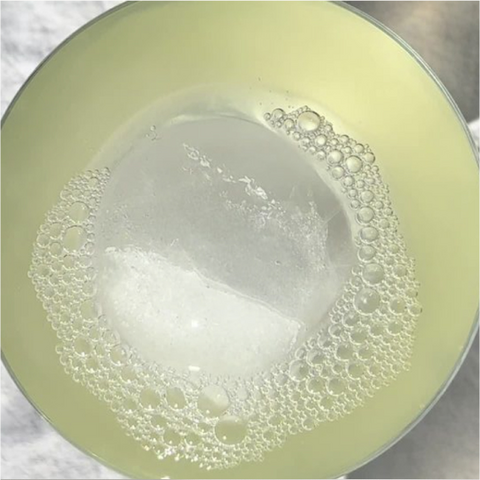Your body needs water to function optimally, but water alone can’t maintain osmotic balance. Electrolytes help fuel your body’s innate electrical system, powering your muscles, nerves, and brain.
Some foods contain electrolytes, but that may not be enough to replenish your body’s supply, especially since so many aspects of daily life are dehydrating — from intense workouts to taking hot showers.
Being low on electrolytes can have real effects on your ability to function. Have you ever felt drained after a sweaty run in the heat? It's likely because your water intake is low. Dehydration can make you feel like you’re moving mountains when you’re just trying to get through the day. While drinking water can help you replace fluid lost from sweat, plain water doesn’t contain the essential electrolyte compounds your body needs to maintain homeostasis. If you do not have a healthy electrolyte level, you may develop an electrolyte imbalance.
These minerals, including Potassium, Calcium, Magnesium, and Sodium, help power your muscles and nerves. Making sure you get plenty of electrolytes can make a world of a difference. So, how can you add electrolytes to water naturally? Here we explain the benefits and how to add electrolytes to water with simple, everyday ingredients.
What Are the Benefits of Adding Electrolytes to Water?
Adding electrolytes to your water can provide numerous health benefits, especially when plain water isn't enough to maintain proper hydration. Electrolytes such as sodium, potassium, calcium, and magnesium help regulate fluid balance, support muscle function, and maintain an optimal electrolyte level in your body. Electrolytes can give you energy as well, making it a great supplement for daily use.
Whether you're recovering from an intense workout or dealing with dehydration, boosting your electrolyte intake can help you feel more energized and improve overall well-being.
Some key benefits of adding electrolytes to your water include:
- Enhanced hydration: Electrolytes help your body absorb water more efficiently, preventing dehydration and maintaining hydration levels.
- Muscle function support: Essential minerals like potassium and calcium are crucial for muscle contractions and reducing cramps.
- Balanced electrolyte levels: Replenishing electrolytes lost through sweat or other factors helps avoid electrolyte imbalance and keeps your body functioning optimally.
Whether you choose electrolyte powder, sea salt, or even coconut water, knowing how to add electrolytes to water can make a significant difference in your daily hydration routine.
6 Ways to Add Electrolytes to Water
You can get some electrolytes through food, but hot conditions, strenuous workouts, and illness can up your need for these vital minerals. How can you make sure to top up your mineral stores with electrolyte water? Keep your fave water bottle on hand and add the following to boost the electrolyte content of your H2O and make your own homemade electrolyte drink. Adding electrolytes to water couldn’t be easier! Plus, it's a great way to improve bodily functions, boost fluid intake, and achieve electrolyte balance.
1. Electrolyte Powder, Tablets, or Drops
This is probably the easiest — and arguably the tastiest — option to improve the electrolyte content of your water. Electrolyte powders, electrolyte tablets, and drops are convenient, mess-free ways to make electrolyte water in a snap.
They’re formulated specifically to replenish your salt and essential mineral stores, so they contain all the good-for-you electrolytes your body needs — no need to measure out ingredients. They also often come in packaging that makes them easy to use on the go. Many people even take electrolytes for hangovers, because of the dehydrating nature of alcohol.
Keep in mind that some drinks that have electrolytes, like sports drinks, also have added ingredients to help boost the flavor profile of your water. Make sure to take a peek at the nutrition label of any sports drink you buy since some electrolyte mixes contain a lot of added sugar to make them palatable or suitable for (literal) marathon efforts.
Mini Dew™ daily electrolyte drink powder supplement is easy to use; just mix 1 teaspoon with 12 oz of water daily or get them in sticks for hydration on the go. This electrolyte powder with trace minerals tastes like organic watermelon, a pinch of minerals, and a dash of pink salt. Instantly dissolves in water, zero sugar.
2. Sea Salt
Did you know that plain water and pink Himalayan salt can serve as a quick and easy electrolyte beverage? A pinch of salt — ideally, sea salt or Himalayan Pink Salt — can quickly boost the electrolyte content of your water. Real salt isn’t just salty. It contains electrolytes in addition to Sodium, like Potassium and Magnesium. Replenish electrolytes in your body with a microplastic-free salt.
3. Watermelon
Is there a fruit that’s more refreshing in the heat than watermelon? You can add cubes of this water-filled fruit to your water to infuse it with Magnesium and Potassium. Don’t love the texture of watermelon chunks floating in your water? Juice your watermelon or puree it, then freeze the liquid in ice cube trays for a tasty H2O addition.
4. Lemon and Other Citrus Fruit
Citrus fruit adds a zesty dose of flavor to plain water and can increase its electrolyte level. Lemon juice, for example, is high in Potassium. Orange juice is also a good source of Potassium. To infuse your water with a citrus punch, toss in some slices and save a few to munch on as a snack.
5. Ginger
Ginger is a well-known superfood thanks to it being so nutrient-dense. It also contains electrolytes like Magnesium and Calcium. You can crush or slice it before adding it to water. Ginger also works well as a hot beverage in tea format. Just steep the ginger root in hot water before pouring a cup.
6. Coconut Water
Coconut water is a natural and refreshing way to add electrolytes to water, making it an ideal choice for maintaining electrolyte balance. Packed with essential minerals like potassium, sodium, and magnesium, coconut water helps to restore fluid balance without the added sugar commonly found in sports drinks.
This natural electrolyte drink is a convenient option for replenishing electrolytes after exercise, supporting hydration, and addressing electrolyte imbalances. For those wondering how to add electrolytes to water without relying on processed options, simply mix coconut water with regular water to create a hydrating and nutrient-rich drink or drink it on its own.

Bottom line
Daily hydration is vital. Add-ins like sea salt, watermelon, and citrus can help you boost water’s electrolyte content while giving it a flavor boost. But it’s hard to beat the convenience of Mini Dew™. Add it to your water, mix, and drink to top up your body’s electrolyte stores.
Sources
- D’Elia L, et al. (2011). Potassium intake, stroke, and cardiovascular disease: A meta-analysis of prospective studies. https://pubmed.ncbi.nlm.nih.gov/21371638/
- Electrolytes. (2023). https://www.ncbi.nlm.nih.gov/books/NBK541123/
- Fulgoni K, et al. (2022). Watermelon intake is associated with increased nutrient intake and higher diet quality in adults and children, NHANES 2003–2018. https://www.mdpi.com/2072-6643/14/22/4883
- Ginger root, raw. (2019). https://fdc.nal.usda.gov/fdc-app.html#/food-details/169231/nutrients
- Millard-Stafford M, et al. (2021). The beverage hydration index: Influence of electrolytes, carbohydrate and protein. https://www.ncbi.nlm.nih.gov/pmc/articles/PMC8465972/
- Seal salt vs. Table salt. (2018). https://www.heart.org/en/healthy-living/healthy-eating/eat-smart/sodium/sea-salt-vs-table-salt
- Watermelon, raw. (2019). https://fdc.nal.usda.gov/fdc-app.html#/food-details/167765/nutrients

.png?v=1698101273040)
.png?v=1698101287039)











